
For over fifty years, Planet magazine has fostered new writers and new writing as part of its core mission.
We are always on the lookout for new voices and our annual New Writers’ Article Competition (which replaces our Young Writers’ Competition) invites entries from new writers of all ages. You can find out more about it here
As well as fostering younger voices, we are very open to publishing writers who are coming into their own later in life, or turning to journalism as a way to disseminate their research, experience or expertise.
In the past, we have been among the first outlets to publish many writers who are now well established: we are proud that these have included Charlotte Williams, Mike Parker and Peter Lord. In the last few years, writers who have contributed to Planet while coming to greater prominence have included Polly Manning and Eric Ngalle Charles.
In the links below, we pick out some of the new writing from the past few years that has stayed with us, from poems to polemic. We hope you will be inspired by these writers’ fresh ideas, their ways of engaging with the world, and the possibilities they present for social and environmental justice.
If you like what you read here, you can buy back issues of the magazine through our shop https://www.planetmagazine.org.uk/shop
Want to see more online? Every subscriber with a standard subscription can have free, exclusive access to Planet Digital, which features back issues from 2015 onwards. If you’re an individual subscriber with a standard subscription and don’t yet have access to Planet Digital, simply email us a [email protected].
If you’re not already a subscriber then why not subscribe today? Please go to https://www.planetmagazine.org.uk/shop and select either a standard subscription or a Planet Digital-only subscription.
Note: Planet Digital is not available for institutional subscriptions.
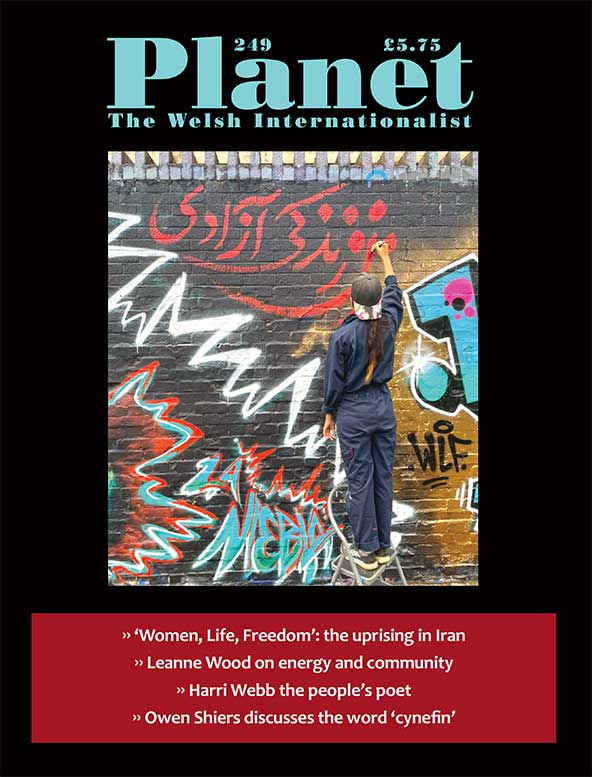
Planet issue 249

Planet issue 249
As the world watches the brutal repression of women protesting in Iran, Shara Atashi examines the roots of ‘Jineology’, a radical feminism born of the Kurdish resistance movement.
Read more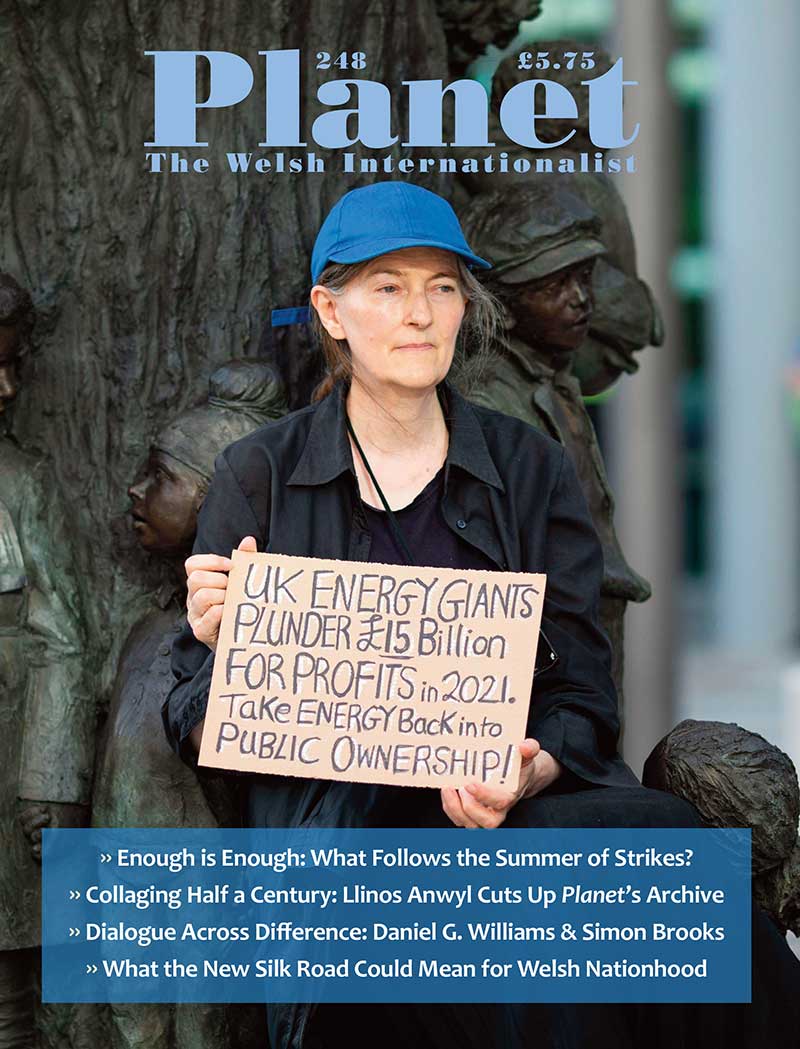
Planet issue 248
This summer we asked Llinos Anwyl if they would like to create three collages in response to Planet’s archive to display at our 50th anniversary celebration this September. We love Llinos’s irreverent, Dadaist approach to Welsh print culture and radical politics so were delighted when they agreed!
Read more
Planet issue 248
Our Welsh Keywords series offers contemporary perspectives on the meaning of Welsh words, inspired by Raymond Williams’ Keywords. In this issue, Sara Louise Wheeler describes how she found herself chafing against the restrictions of academic writing and discovered the tradition of the ‘Ysgrif’ – the personal essay. She argues that this mode of expression is one that neurodivergent people can excel at in particular.
Read more
Planet issue 248
Harriet Protheroe-Soltani responds to an article in Voice.Wales to argue how while the Act is designed to strengthen the bargaining position of senior trade unionists, that with creative thinking the Act could be used as an organising opportunity to empower workers in a cost-of-living crisis.
Read more
Planet issue 248
Congratulations to the winner of our New Writers’ Competition! In his article, Emlyn Phillips traces connections between the Celtic Britons and eastern Eurasia, Iolo Morganwg, and the precarity, yet possibility, ahead for Wales as power arguably again shifts eastwards to the ‘New Silk Road’.
Read more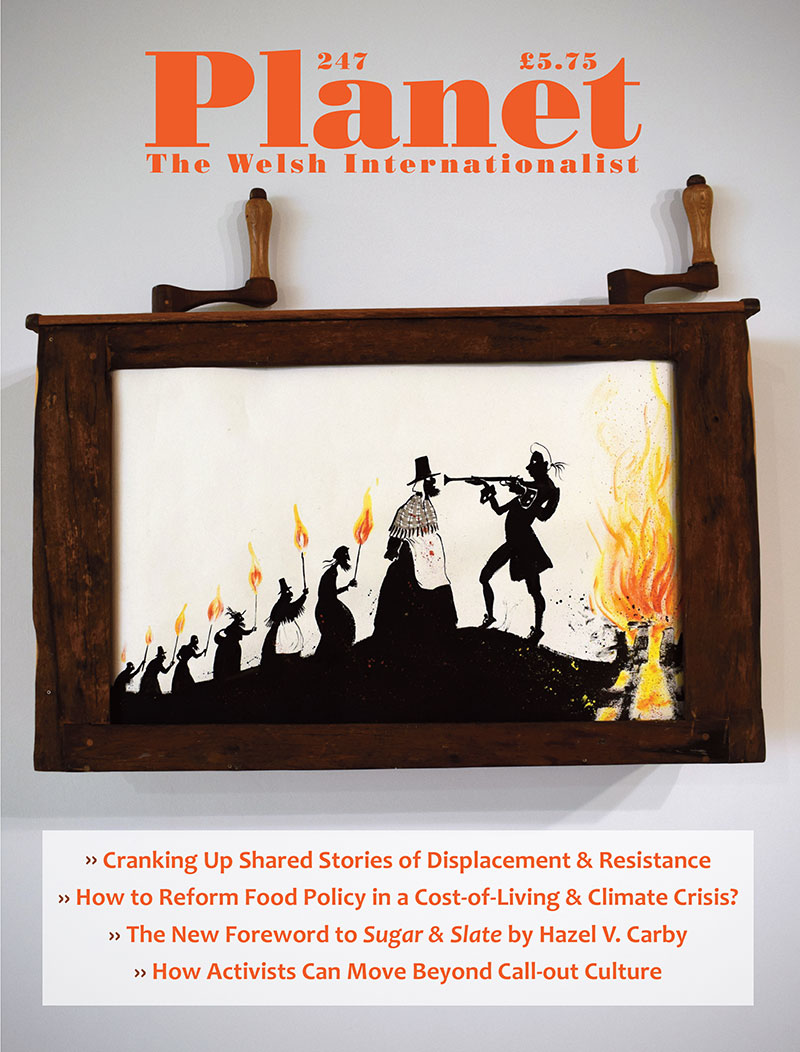
Planet issue 247
As the Eisteddfod re-gathers in Tregaron, Frances Roberts Reilly draws on her ancestry to trace its connections with Romany Gypsy Traveller communities. She calls for solidarity with the people who attend another festival which has deep resonance for a minority culture: Appleby Horse Fair –interviewing key figures about why this event was the launch of a ‘summer of discontent’ against a Police Act that will criminalise a 500-year-old nomadic heritage.
Read more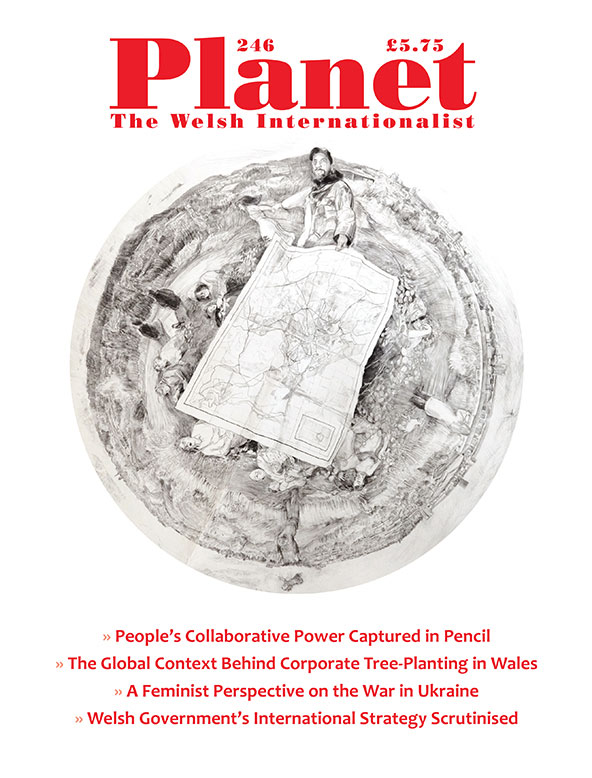
Planet issue 246
Our Welsh Keywords series offers contemporary perspectives on the meaning of Welsh words, inspired by Raymond Williams’ Keywords. In this issue, Mabli Siriol Jones draws on her experience growing up in Grangetown to discuss the complexities of gentrification (boneddigeiddio) across Wales, arguing why we need to understand this in relation to class and the political system if we are to challenge these inequalities in empathetic ways that don’t set communities against each other.
Read more
Planet issue 246
In a piece of autofiction, Durre Shahwar relives an encounter that left her longing for familiarity and safety.
Read more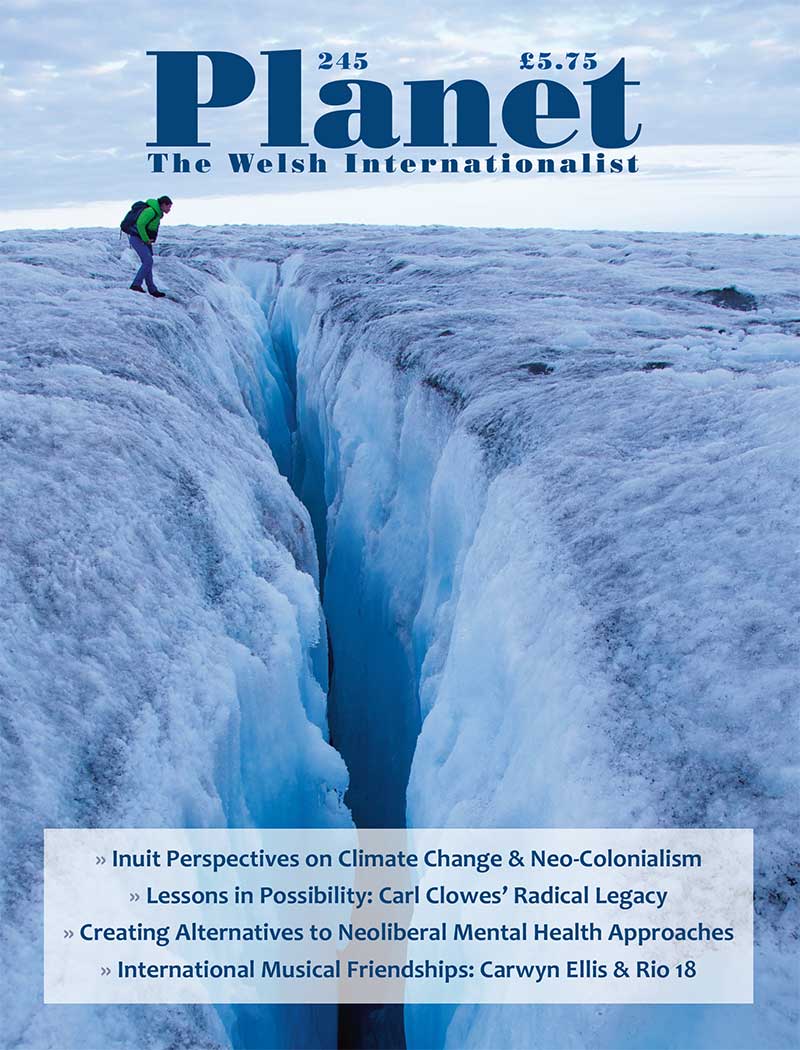
Planet issue 245
Billy Jones draws on Raymond Williams, Mark Fisher and new books from Wales to argue how a neoliberal orthodoxy continues to blight the health and happiness of Valleys communities, thereby internalising external miseries as mental illness. However, is consciousness about this beginning to shift?
Read more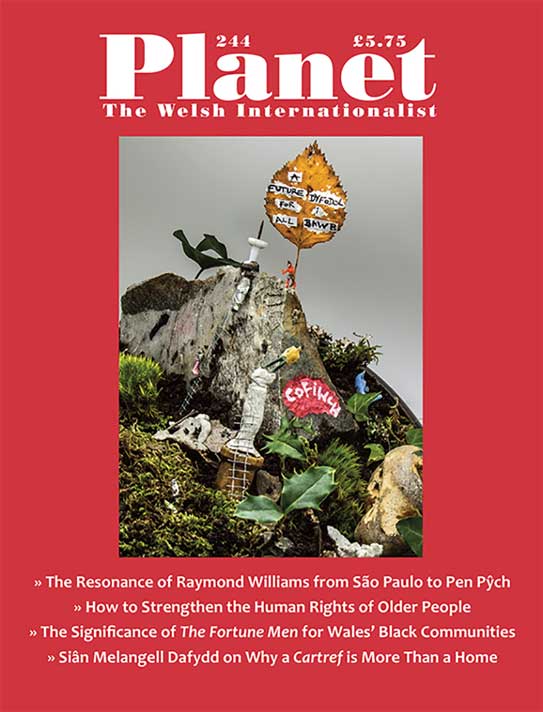
Planet issue 244
Yvonne Connikie gives an insight into her research into the leisure activities of Caribbean Elders in south Wales, and the zest for life she has discovered. She draws on theories of leisure, gender and Critical Race Theory to address the obstacles her interviewees face when seeking to enjoy themselves.
Read more
Planet issue 244
Congratulations to the winner of our 2021 New Writers’ Article Competition! Phil Jones describes how an Abereiddi folk musical generated reflections on the ways in which the turbulence, profiteering and stark inequality of the industrial revolution are paralleled in our pandemic era.
Read more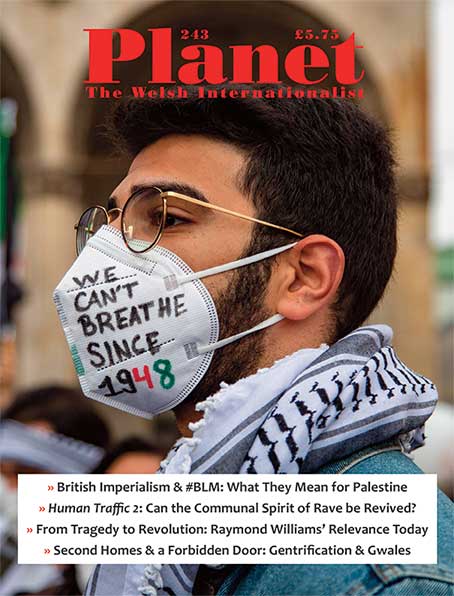
Planet issue 243
Kandace Siobhan Walker recounts what first sparked her consciousness about the situation in Palestine, and the long roots of solidarities between this struggle and the Black liberation movement, recommending resources for informed activism.
Read more
Planet issue 243
Clare Davies details the resonance of Williams’ life and work in pandemic-era Wales. She highlights Williams’ exploration of how everyday personal tragedy can transform into a revitalised sense of humanity and drive for social change; and how Welsh intellectuals can commit to this struggle.
Read more
Planet issue 243
Hanan Issa recounts the thrill of feeling more alive through sea-swimming, as experienced from Ogmore beach to Bali; but draws on mythology and present-day realities to convey what the dangers of this same body of water mean for the devalued lives of others.
Read more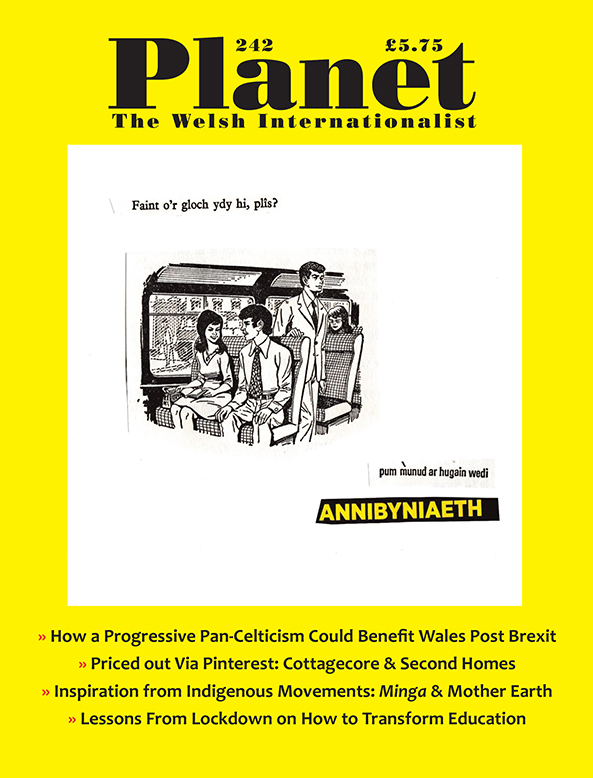
Planet issue 242
Collage artist Llinos Anwyl investigates the online subculture of ‘cottagecore’, which has become popularised during the pandemic, and argues that the class dynamics of this aesthetic threaten to exacerbate gentrification in her home village of Moelfre and beyond.
Read more
Planet issue 242
In a series that proposes how society could change for the better in response to Covid-19, headteacher Rajvi Glasbrook Griffiths reflects on what has been learnt under lockdown about how to instil a distinct and pluralistic sense of Welsh identity, how to re-conceive of ‘wellbeing’ in relation to achievement, and a new way of understanding equality.
Read more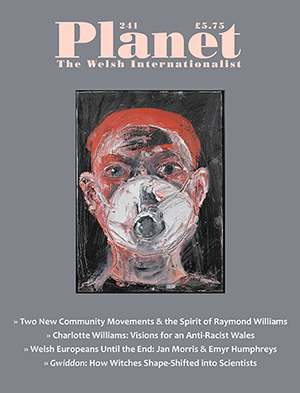
Planet issue 241
Our Welsh Keywords series offers contemporary perspectives on the meaning of words in Welsh, inspired by Raymond Williams’ Keywords. In this issue, Sara Huws explores the fascinating history of how a word for ‘witch’ shape-shifted into one for ‘scientist’. What is the gender dimension of this etymological journey, and what does this mean in an era of pandemic and big data?
Read more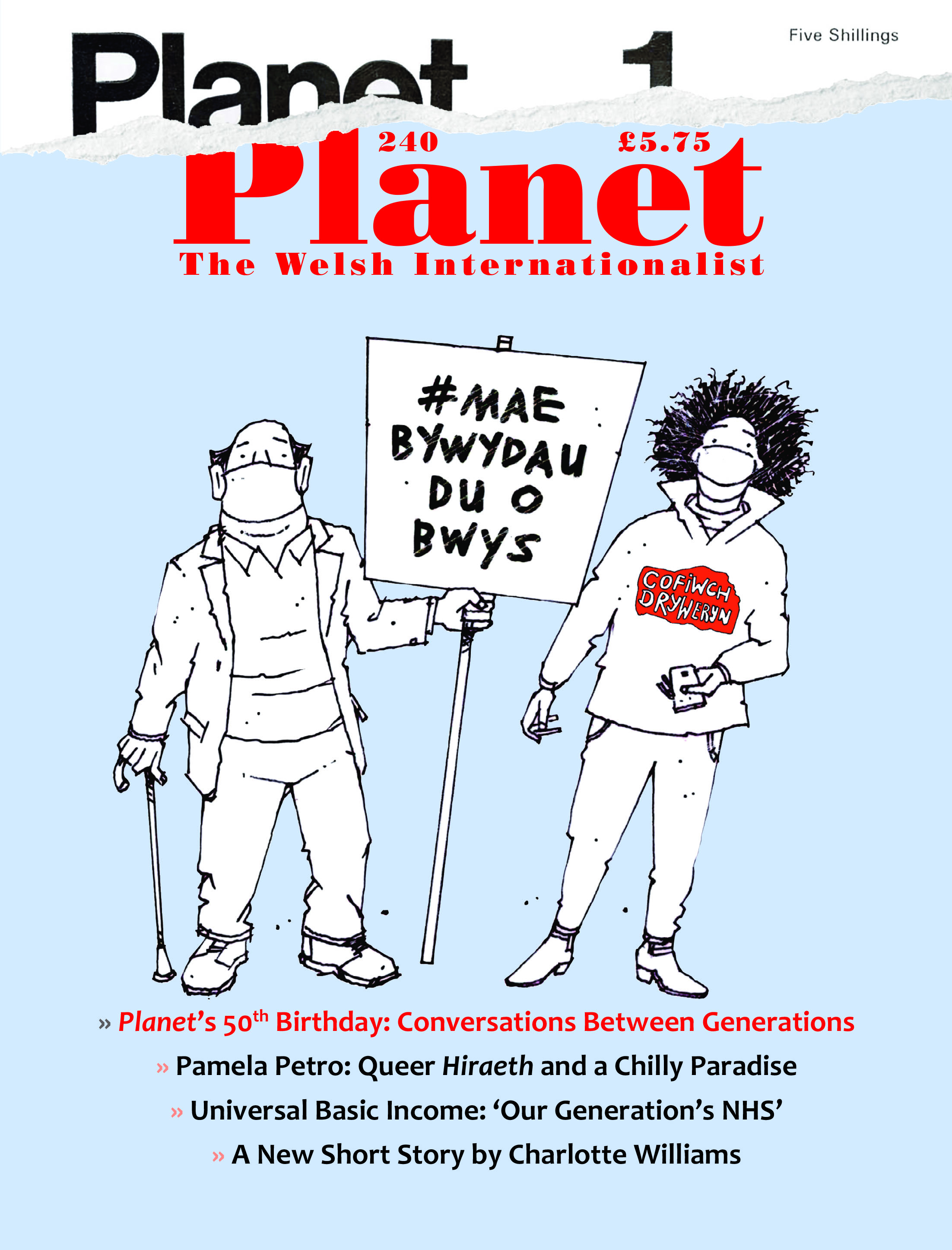
Planet issue 240
Harry Waveney reflects, in his competition-winning article, on the values he’s discovered through Kurdish solidarity activism.
Read more
Planet issue 240
Yasmin Begum reviews two recent artistic works springing from Cardiff’s multicultural history.
Read more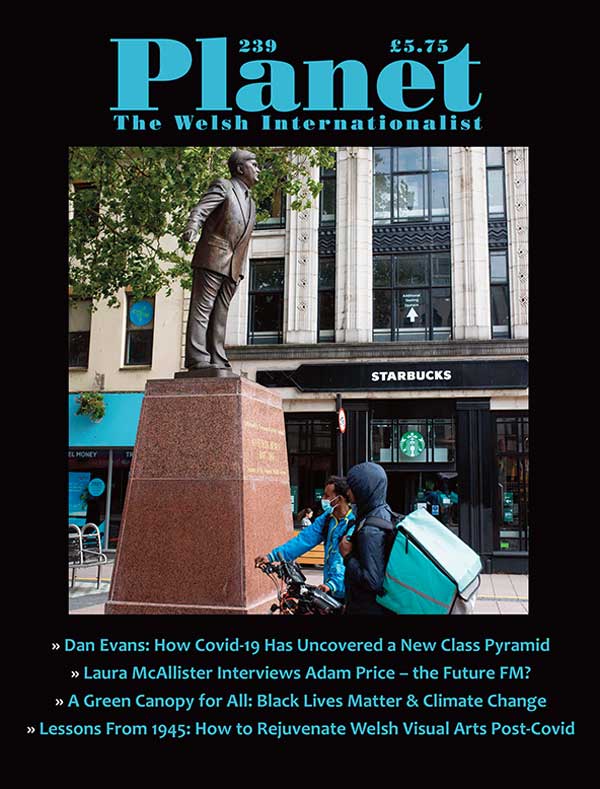
Planet issue 239
Faith Rhiannon Clarke interviews Butetown human rights lawyer Hussein Said on why Black lives matter in environmental activism
Read more
Planet issue 239
Peter Jingcheng Xu counters Western stereotypes of China with this insight into how Daoism might inform global struggles against pandemics and climate change.
Read more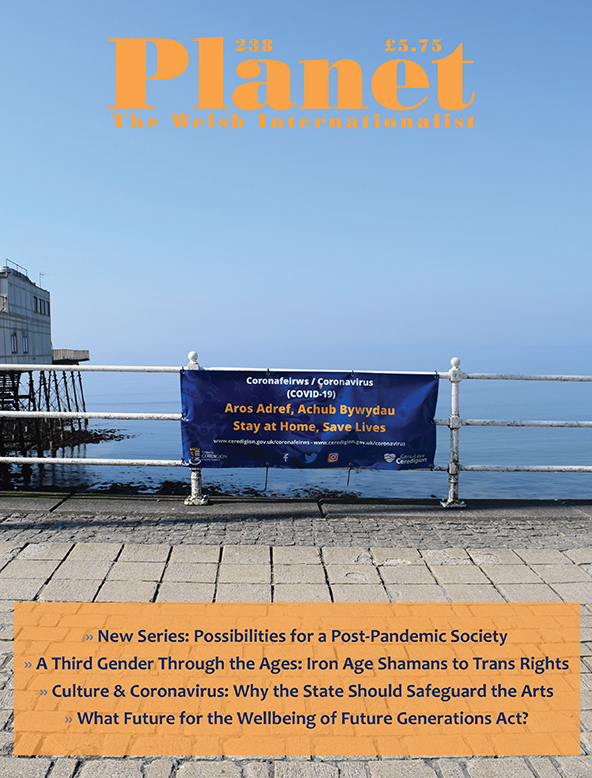
Planet issue 238
Hafren Evan traces the history of a third gender way back to the Iron Age.
Read more
Planet issue 238
Kieron Smith writes about state support for the arts in Wales.
Read more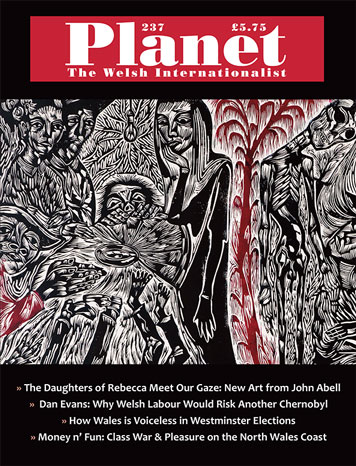
Planet issue 237
Gareth Leaman details the reasons why Wales as a partially devolved polity barely existed in the 2019 UK general election campaign.
Read more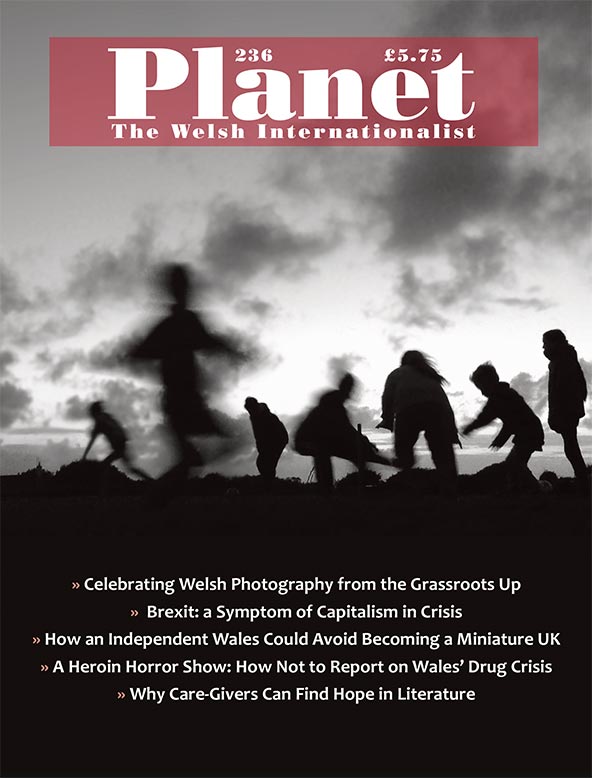
Planet issue 236
Artist Paul Eastwood on the word ‘dadweirlled’ (metamorphosis, shape-shifting) and the use of Welsh for abstract ideas in the visual arts.
Read more
Planet issue 236
Neetha Kunaratnam’s poem, ‘Brexit means Breakfast’, brings us britwurst and celtberries.
Read more
Planet issue 236
Mark S. Redfern won our 2019 Young Writers’ Essay Competition with this piece about the sensationalising of Swansea’s heroin crisis.
Read more
Planet issue 236
Eric Ngalle Charles has a close encounter on a train journey from Cardiff to Hay.
Read more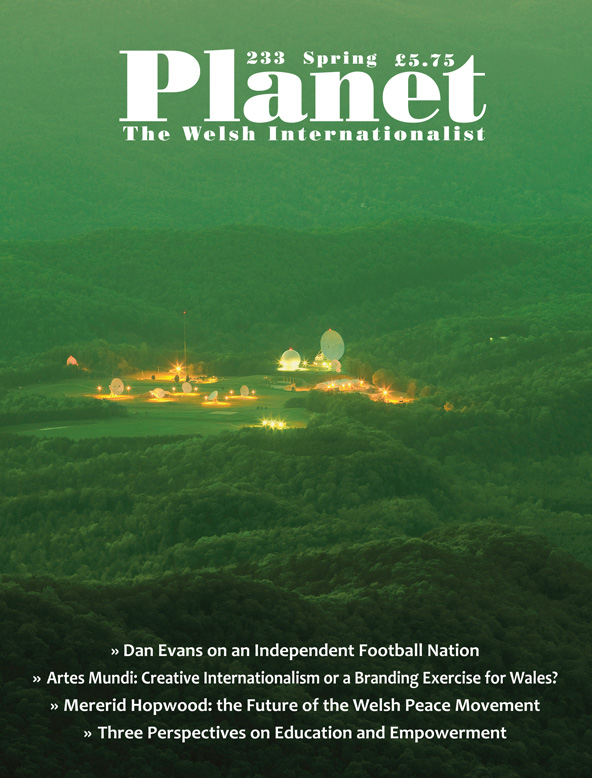
Planet issue 233
Dan Evans celebrates Welsh football fan culture and how this contributes to national unity, internationalism and working-class self-organisation.
Read more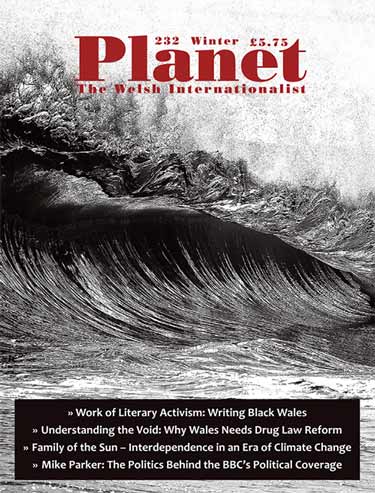
Planet issue 232
Sophie McKeand examines what a libertarian leftist approach could bring to drug-law reform.
Read more
Planet issue 232
Rebecca Brown won our 2018 essay competition with this piece about narratives of hope and the Wellbeing of Future Generations Act.
Read more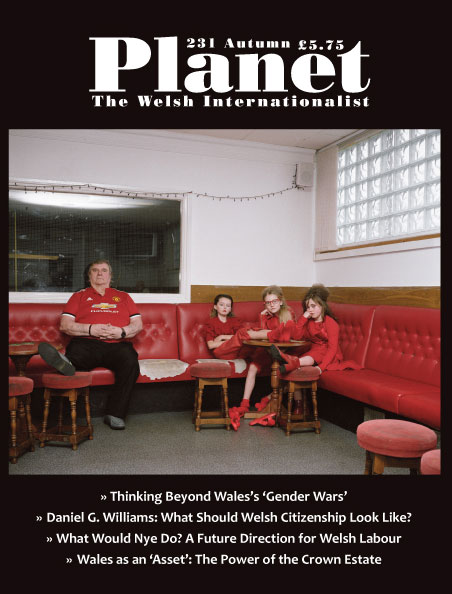
Planet issue 231
Daryl Leeworthy asks ‘What Would Nye Do?’ in respect to the future of Welsh Labour.
Read more
Planet issue 231
Catrin Ashton recounts how a Marxist pamphlet helped her to see mothering as essential and productive labour.
Read more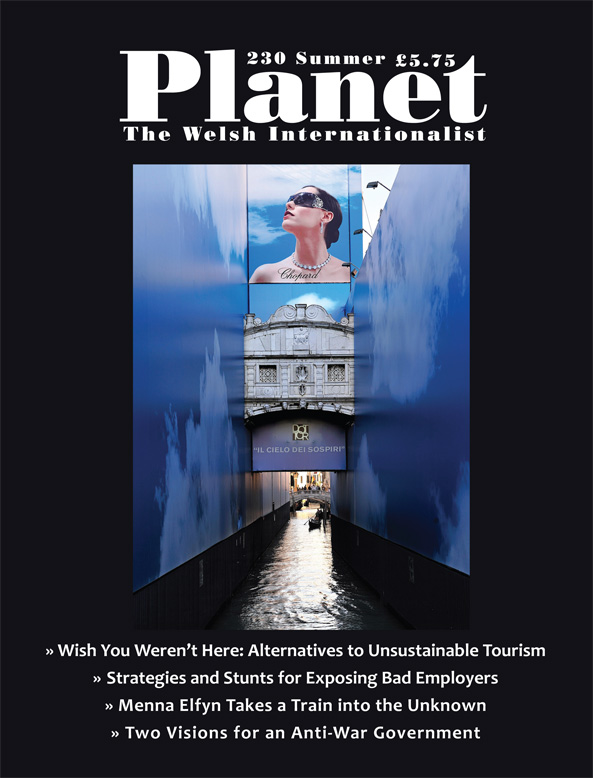
Planet issue 230
Lisa Sheppard, who acquired Welsh at school, explains what ‘mamiaith’ (‘mother tongue’) means to her.
Read more
Planet issue 230
Rhian E. Jones writes about minority languages across Europe.
Read more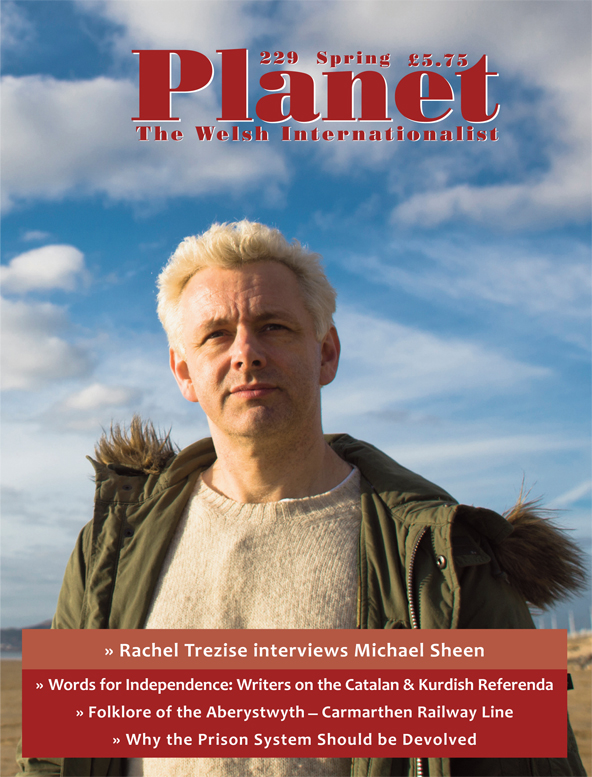
Planet issue 229
Eluned Gramich looks at citizenship and displacement through the lens of her family’s experience.
Read more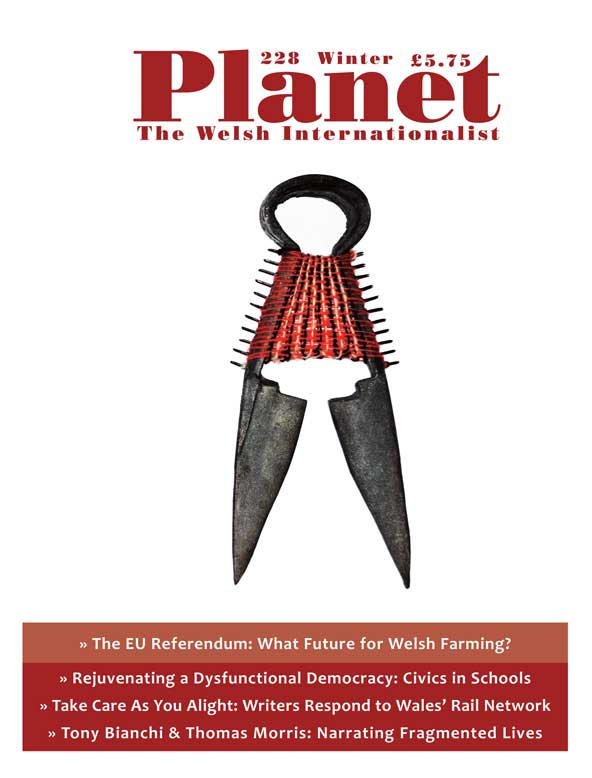
Planet issue 228
Ffion Jones draws on her experience as a sheep farmer and film-maker to offer proposals for safeguarding Welsh national interests post-Brexit.
Read more
Planet issue 228
Polly Manning explains why Oxford University made her sick in this winning entry to the 2017 Planet Young Writers’ Essay Competition.
Read more
Planet issue 228
Poet Emily Blewitt celebrates the postmen and pigeon-breeders who are ‘The Men in My Family'.
Read more
Planet issue 227
Sara Peacock explores the similarities between prejudice against LGBT+ people and against Welsh speakers.
Read moreStay connected to Wales' most accomplished writers: take out a subscription https://www.planetmagazine.org.uk/shop